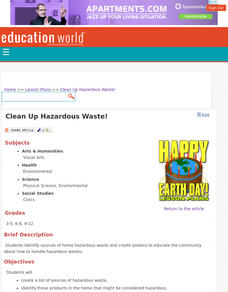Curated OER
Why Recycle?
Students use Internet Research to list at least 10 ways to recycle resources at home, school and work. They divide into groups, pool their knowledge and prepare infomercials explaining their recycling strategies.
Curated OER
Recycling Quest
Students integrate the concept of recycling into an aerobic activity. They incorporate the use of baskets, crates, wrist bands, vests, and bean bags, They play a remote game until all the "trash" is retrieved.
Curated OER
Recycling Relay
Students improve their locomotor skills and their knowledge of recycling. They participate in a relay as they recycle different objects into their proper containers.
Curated OER
Recycling for Raptors
Students write persuasive letters in support of the Recycling for Raptors campaign. They review raptor groups and names and categorize the raptor species and the groups which they belong. They research businesses, schools, and...
Curated OER
Recycled Sailing Vessels
Students discuss how recycled materials can be used to create art and how this will apply to their artwork. They create a sailing vessel using recycled materials that they find.
Curated OER
Recycling Program
Students develop and implement a recycling program in their school. Students work in groups to complete tasks in their student-created recycling program. They keep records of the items collected, the amount of money earned, and the...
Curated OER
Soild Waste and Recycling
In this unit of lessons, learners examine solid waste and recycling. They discover the concept of decomposition. They also observe the decomposition process and make observatins.
Curated OER
Recycling
Students examine different "cycles" that are found in nature, such as the water cycle and recycling. They create their own artwork about cycles to be displayed on a bulletin board
Curated OER
Recycling and Reusing
Students complete the associated worksheets as they investigate ways to recycle and reuse common objects. They share ideas on reusing objects while practicing listening, speaking and note-taking skills.
Curated OER
How to Make Recycled Egyptian Paper
Students participate in a lesson that focuses on the production of Egyptian paper used for writing in modern times. They research the process of recycling and how it can help to preserve natural resources. Then students reproduce their...
Curated OER
Recycling Paper
Students recycle old paper into new. In this sustainability instructional activity, students take old newspaper and recycle it into new paper.
Curated OER
Solid Waste and Recycling
In this unit of lessons, young scholars examine solid waste and recycling. They examine the relationship between Native Americans and land. They also decorate bags in which they discover the concept of decomposition.
Curated OER
Recycling Garden Waste
Young scholars experience how to make compost. This lesson is ongoing with periodic checks and maintenance. They select a piece of ground around the school or around their homes to establish a compost pile. Organic materials are utilized...
United Nations
Compost Monitor Training
What should go in the trash, and what can be composted? Guide your young conservationists through the process of composing their trash with a lesson about the different ways we can dispose of garbage. Using a trash bag with clean...
Curated OER
Solid Waste
Students determine the percentage increase in output of solid waste in the U.S. They determine the length of time it takes for throw away items to decompose.
WakeGOV
Plastic Sight Words
Plastic math? Have young learners count and name the number of plastic items in their centers. Kindergartners match sight word cards to the number of plastics in a given group, while learning that plastics come in all different shapes,...
Curated OER
Middle-East Reflections
Practice symmetry and patterns with this Mid-Eastern art project. Your class will create beautiful, reflective mosaics that will brighten up the classroom! A list of necessary materials is included.
Dick Blick Art Materials
“Gawu” — African-influenced Tapestry
Here's a great way to combine environmental science with art. Kids use recycled materials to create their own Gawu, a tapestry made of discards. Although designed for special education classrooms, the activity is sure to engage all...
Curated OER
The Waste-Free Lunch
Reusable packaging for school lunches seems like a wonderful and eco-friendly idea; however, some children are being chastised for not following one school's guidelines. This New York Times article engages learners in reading...
Curated OER
Clean Up Hazardous Waste!
Students identify sources of home hazardous waste and create posters to educate the community about how to handle hazardous wastes.
Chicago Botanic Garden
Personal Choices and the Planet
The last activity in the series of four has individuals determine steps they can take to reduce their carbon footprints and then analyze their schools' recycling programs. Through a sustainability audit, they identify how and where their...
University of Southern California
Mastering Microbes
Small but mighty! Learners explore the role of microbes in a healthy ecosystem. An engaging lesson asks pupils to design an aquaponics system that demonstrates that healthy microbes are necessary to maintain the ecosystem.
Wild BC
Bearly Any Ice
After reviewing food chains, your class members participate in an arctic predator-prey game that exemplifies the impact of climate change of food availability. If you are in a hurry, skip this lesson, but if you have the time to...
Chicago Botanic Garden
Calculating Your Carbon Footprint
Unplugging from technology for one day per week will decrease your carbon footprint—are you up to the challenge? Part two in a series of three allows individuals to explore their personal carbon footprints. By first taking a quiz at home...
Other popular searches
- Recycling Lessons for Art
- Recycling Lessons Plan
- Recycling Lessons Plan Free
- Art Recycling Lessons
- Esl Lessons Science Recycling

























